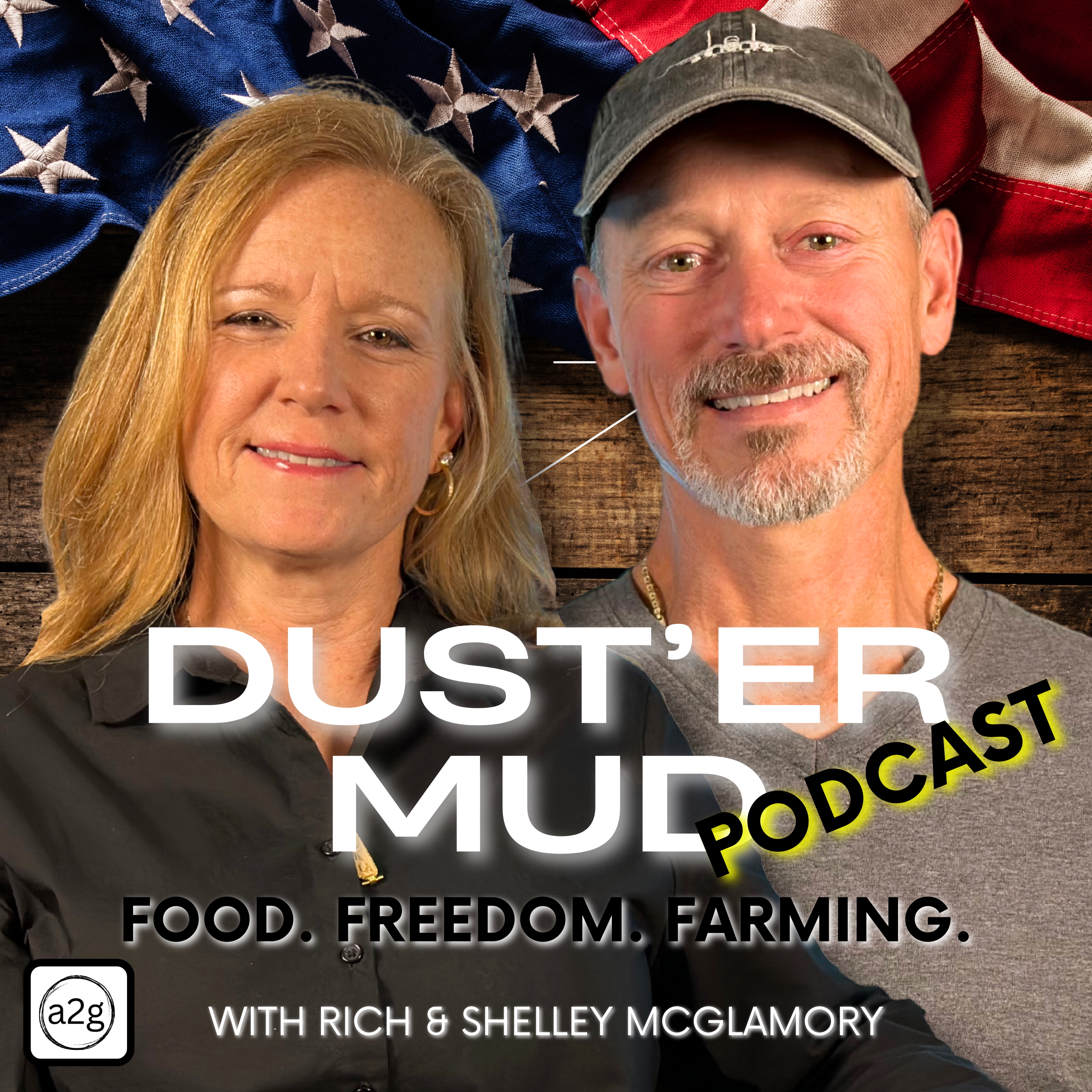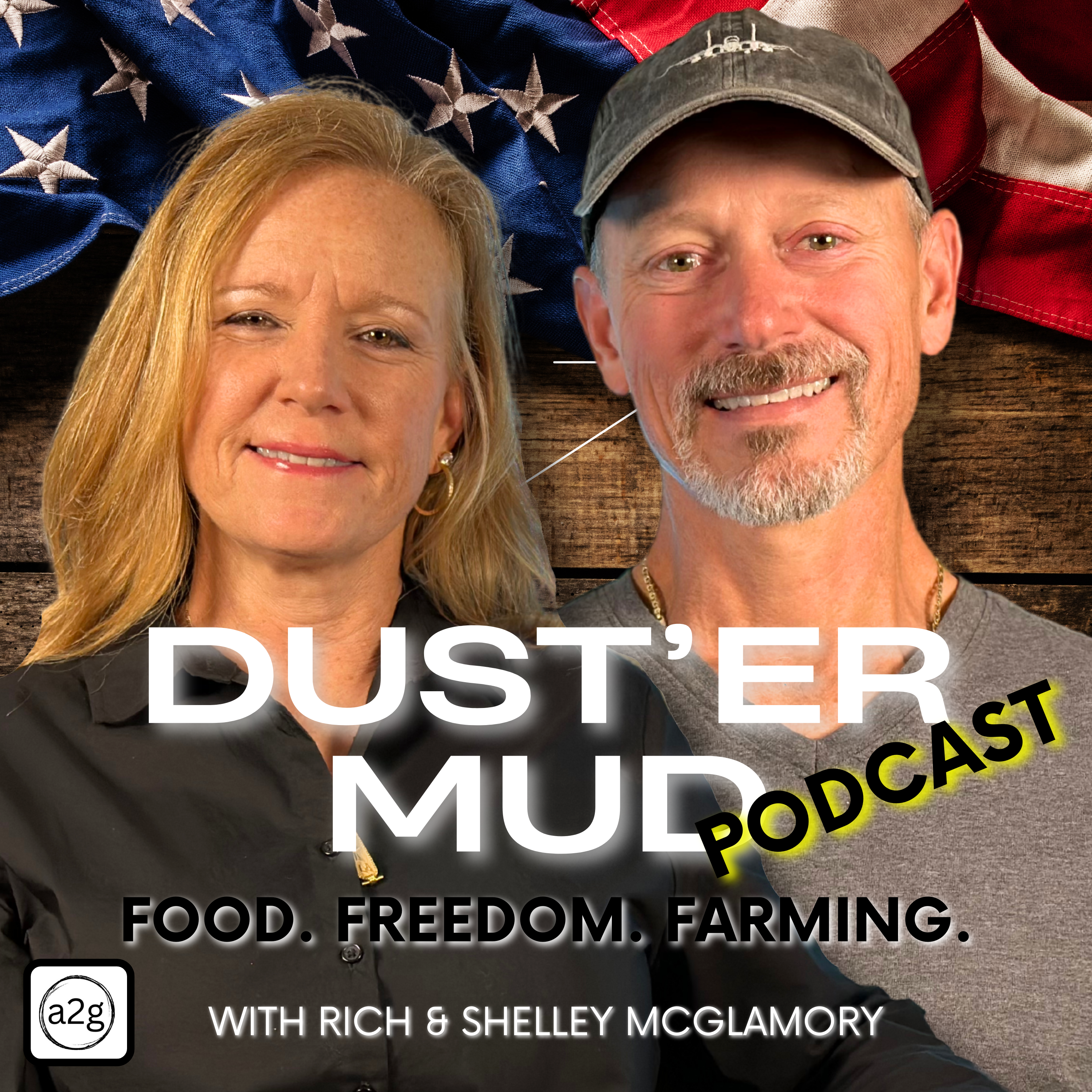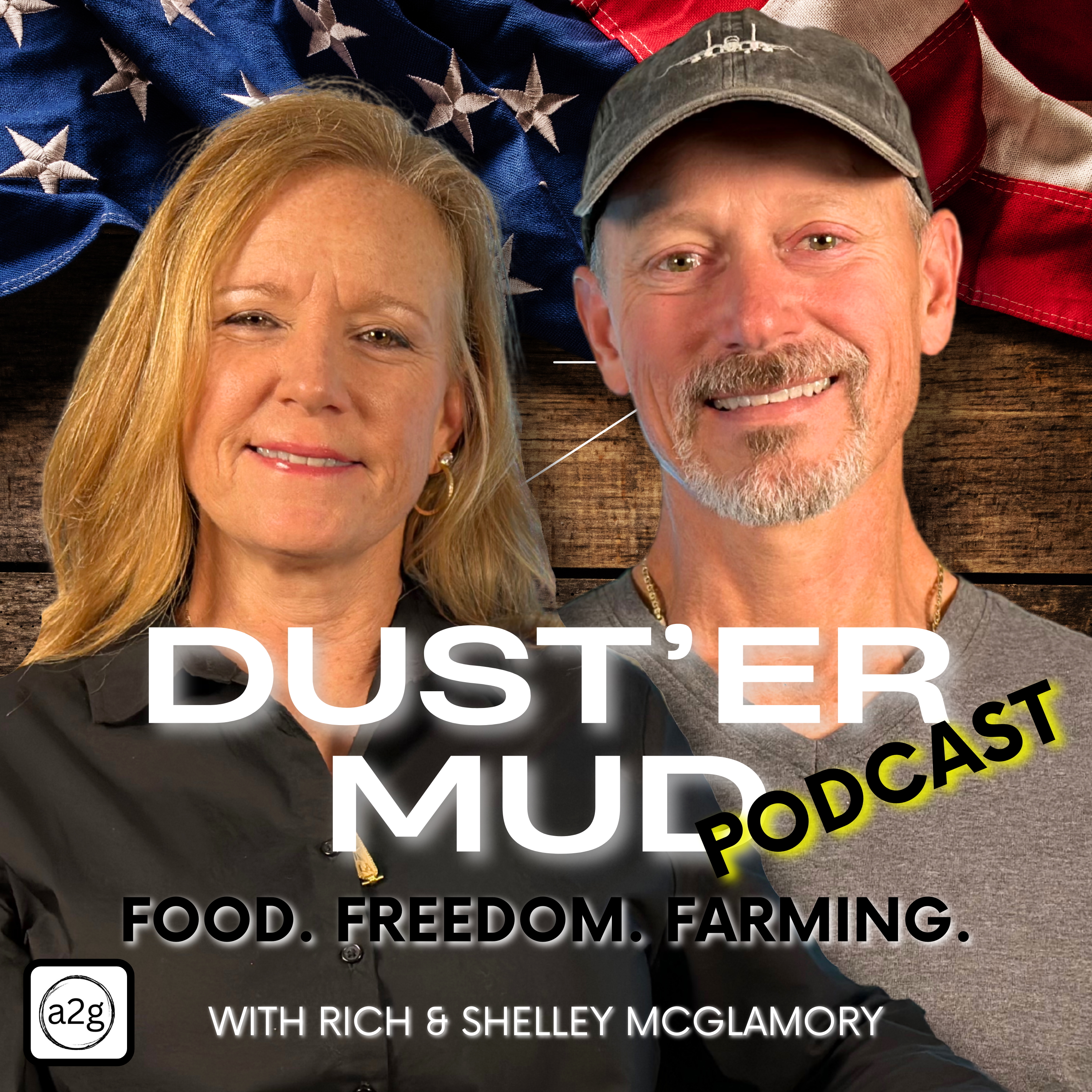Episode Transcript
[00:00:00] Speaker A: So, because of our principles and because of our ideals of equality and land ownership and citizenship and the freedoms that we have in this country, freedom often brings risk. Or is risk in general?
[00:00:15] Speaker B: Yeah, this is one of those cases. Are you interested at all in food security of the United States of America? In the last decade, communist China's investment in us ag land has grown 10% tenfold. Spend 15 minutes with us, and we'll review with you the Foreign Adversary Risk Management act, the Protecting american agriculture from Foreign Adversaries act, and then we'll give you our take on why these fall short.
[00:00:44] Speaker A: Welcome to the Duster Mudd podcast. I'm Shelley.
[00:00:46] Speaker B: I'm rich.
[00:00:47] Speaker A: After 25 years of being in the air Force, sometimes working in the Pentagon, we've retired to the Ozarks, Missouri, and started a first generation farm. And on this podcast, we like to talk about food freedom and farming. And today, it's going to be about all three. In recent news, there has been a lot of buzz about foreign countries coming into our nation and buying up farmland.
[00:01:11] Speaker B: Yeah, we've. We've been hearing about it. They introduced an act in 2022, and it finally got passed in 2024. The. The Farm act, which stands for Foreign adversary Risk Management act. And then last week, the House passed a bill also the Protecting American Agriculture from Foreign Adversaries Act.
[00:01:38] Speaker C: I rise in support of the Protecting american agriculture from Foreign Adversaries act.
[00:01:43] Speaker A: Okay, man, it sounds like the farmers and the citizens of this country are going to be able to be rest assured that the government is doing something to stop China and Russia and North Korea and our other adversaries from buying up our farmlands. I mean, the titles of these acts just really give the citizens, give us some sort of comfort in what the acts are doing.
[00:02:12] Speaker B: Yeah, I would say we shouldn't have feel comfortable just based on the titles of the act. Let's look a little closer.
[00:02:19] Speaker A: Well, in the sound bites, it certainly sounds good.
[00:02:23] Speaker B: It does.
[00:02:24] Speaker C: I'm proud to have helped introduce this important piece of legislation to protect our food supply from foreign adversaries like communist China.
[00:02:32] Speaker B: It does sound good.
[00:02:33] Speaker A: Okay, so how did we get here?
[00:02:35] Speaker B: So, I think we've all been seeing and probably even feeling concern about foreign nations buying up our farmland.
One of the big purchases that we're probably all aware of was when a chinese company bought Smithfield, and with that came almost 150,000 acres of us farmland.
[00:03:04] Speaker A: Smithfield is the largest pork, one of the largest pork producers in the United States.
And they don't own just Smithfield pork. I mean, we've all go to the. When we go to the grocery store, you see Smithfield ribs and pork butts and all of the. All of the things. But Smithfield goes a little bit beyond that also. And so whenever, in 2013, whenever they bought that company, they bought up a large portion of our food supply.
[00:03:36] Speaker B: Yeah, definitely the. Their number one pork producer in the US. But it's Nathan's and Eckridge. Like, there's other brand names, not just Smithfield, that Smithfield owns.
[00:03:48] Speaker A: I think people would be astonished at the number of actual sub companies that are underneath SmitHFIELD that are chinese owned, that we believe to be american owned food companies.
[00:04:02] Speaker B: Yeah. So with that kind of purchase, people start getting concerned with a foreign nation, especially one that's listed as an adversary of the United States, owning, I mean, being our largest pork producer, owning a large portion of the food that feeds us as a nation.
[00:04:22] Speaker A: Well, it's not just the food, though. They're also buying up lands near tactical places in our country.
[00:04:30] Speaker B: Yeah. So that's what has happened most recently. To bring this to light. People were already concerned a bit about the food and agricultural purchases, and then we had adversarial nations that were purchasing farmland nearby our military bases, and other.
[00:04:49] Speaker A: Strategic things that we don't necessarily know. And I think that's part of the problem, is these purchases are kind of going underneath the radar, so to speak, and we don't know exactly how much land adversarial countries are actually own.
[00:05:04] Speaker B: Not only is the CCP in our backyard, but we cannot accurately say where. Yeah, and so that's what happened when they introduced the Foreign Adversary Risk Management act or the Farm act. One of the things that it did was put the secretary of agriculture on the CFIUS board, or, sorry, it's a committee. CFIUS stands for Committee on Foreign investment in the United States. So this committee gets together and makes recommendations on whether or not things that foreign entities or companies want to do within the United States should be done.
[00:05:47] Speaker A: So this is not a new organization.
[00:05:49] Speaker B: No.
[00:05:50] Speaker A: Okay. So the committee was already around. What are they? In your experience, having been in that line of work, what are some of the things that this type of committee.
[00:06:01] Speaker B: Typically for me, I dealt with, especially from my years at the Pentagon, when I was in US Air force acquisitions, we dealt with CFIUS as a committee that advised on the foreign military sales transactions that we were doing. While the committee really does only make recommendations, they would make recommendations to the Department of State, who ultimately would approve or deny foreign military sales.
[00:06:32] Speaker A: So their recommendation board, though, they don't specifically, like, block things.
[00:06:40] Speaker B: No, they can't.
[00:06:41] Speaker A: They have power and authority, I guess, is the question.
[00:06:43] Speaker B: The CFIUS makes a recommendation and then the ultimate decision is at the executive branch or the president.
[00:06:51] Speaker A: If we use China as an example of someone coming in and buying up some land to invest in, perhaps they want to put in a solar farm or a wind farm or whatever, you know, these big tycoon type people with bazillions of dollars.
So the president here can get involved, but outside of that, they can come here and buy land.
Like, they can come here and buy land in the United States. Let's role reverse that.
A United States wealthy individual decides, hey, I would like to get involved in business in China. What are our opportunities to be able to go over there and invest in the chinese economy.
[00:07:36] Speaker B: Yeah.
[00:07:37] Speaker A: And farmland.
[00:07:38] Speaker B: The, I don't know, People's Republic of China or the Chinese Communist Party doesn't have. Doesn't allow that. So the urban land in China is state owned and then the rural land is owned by communities. Basically, it's collectively owned. So you don't own your own land. So the idea of a foreign company, or let's say you, you wanted to go buy land in China and put in a wind farm, that's not something that happens.
[00:08:16] Speaker A: It can't happen.
[00:08:16] Speaker B: No, no.
Not even the chinese own land in China.
[00:08:23] Speaker C: China doesn't even allow its own citizens to own land. But we've allowed China to purchase nearly 350,000 acres of our agriculture land.
[00:08:32] Speaker A: Right. Because it's communists.
[00:08:34] Speaker B: Right.
[00:08:35] Speaker A: So the collective owned it.
[00:08:37] Speaker B: Correct.
So in this case, it is an imbalance, really.
If you view the purchase of us farmland as a risk, this is an imbalanced risk. Right. This is a place where China can hold the US at risk by owning farmland and agricultural land and food production companies that the US cannot reciprocate.
[00:09:09] Speaker A: So because of our principles and because of our ideals of equality and land ownership and citizenship and the freedoms that we have in this country, freedom often brings risk, or is risk in general?
[00:09:24] Speaker B: Yeah, this is one of those cases.
[00:09:26] Speaker A: So there's not a real answer, and I'm not sure that these bills get us there.
[00:09:33] Speaker B: Yeah.
The issue is the titles of the bills make it sound like I can sleep well at night.
Right. Like just the title. The Foreign Adversary Risk Management act.
[00:09:50] Speaker A: Yeah.
[00:09:51] Speaker B: The protecting american agriculture from Foreign Adversaries act.
[00:09:56] Speaker A: The average person is going to see the name of that bill, and unless they read down in it, they're going to believe that the government has said, china, you cannot buy our land. Anymore.
Like, that's what, that's what it feels like. And even they're trying to do well.
[00:10:12] Speaker B: And even as they, as the representatives talk about this, our newest act, it is protect our food, protect our freedom. Right. I mean, like, the talking points are very much in line with, if we pass this, we're now safe.
[00:10:29] Speaker C: This bill will help us to block transactions that are a threat to our national security.
[00:10:35] Speaker B: And I say that's a stretch at best.
[00:10:43] Speaker A: But as they presented it, they did present it as a step in the right direction, not necessarily the whole entire answer, but a step towards being able to at least get a grasp on some of these purchases.
[00:10:59] Speaker B: Yeah.
[00:11:00] Speaker A: One isn't canceling the other. It sounds like one is like sub paragraph a. It's like this building on maybe.
[00:11:09] Speaker B: Yeah. The newest one, it basically makes, the way I understand it, it makes the appointment of the secretary of agriculture to CFIus a permanent thing. And it specifically lists out China, Russia, North Korea and Iran as adversaries. And any transactions, and it's not just land purchases, it's technology dealing with agriculture and transportation. Dealing with agriculture, like any of those things, will automatically trigger a CFIUS review.
[00:11:44] Speaker A: A risky run, though, is a negative to this newest one would be the just wholesale discrimination against people who might already be here and are from those countries and want to buy that land. So it could, the newest one could prove to be, though, they're trying to dial it in. I think the verbiage is a little bit, well, specific, vague, and it puts it on actual persons.
[00:12:14] Speaker B: So it, again, it doesn't block the purchases or any of the transactions, it triggers a review.
And it's true. If you are a, with the bill as passed through the House, it's made it to the Senate right now, but as passed through the House, if you are a citizen of one of those adversary nations and you're in this country on a green card or a visa or whatever, and you're wanting to make one of those transactions that is specifically listed, it would be flagged as requiring a CFIUS review. And to me, that does not equal wholesale discrimination. To me, that is wise scrutiny to mitigate a risk that is not reciprocated with those other nations.
[00:13:05] Speaker A: Since we have freedoms, since we are open, since we offer all of the opportunity to all of the people to ask, hey, little bit of. A little bit of scrutiny, a little bit of vetting.
[00:13:17] Speaker B: Yes.
[00:13:18] Speaker A: Before we say here's 200,000 acres, or.
[00:13:22] Speaker B: Here'S 350 acres outside one of our air force bases.
[00:13:25] Speaker A: Oh, yeah, that's sketchy right.
Because.
[00:13:32] Speaker B: So it triggers. It triggers a review.
[00:13:34] Speaker A: Okay. Okay.
[00:13:36] Speaker B: The bottom line is these acts add a little bit to what already existed.
[00:13:44] Speaker A: But there's been no real substantial change.
[00:13:46] Speaker B: No, the committee already existed. The committee could have looked at any of these things already had they chosen to. They could have made a recommendation to the president on any of these things had they chosen. This makes it formal that the secretary of agriculture is part of the committee, and it formalizes some of the transactions that would require a review. I think the bottom line is these acts sound great.
They sound.
If you're paying attention, they sound redundant.
Hopefully we covered a little bit of what the differences between the two acts are, and I think my takeaway would be these particular acts don't make me sleep better at night.
This is not a security blanket for me saying, oh, yay. Now China can't control our ag land.
Although the titles say that.
It really doesn't make me feel that way.
[00:14:53] Speaker A: All in all, Americans need to own our ag land so that we have food security and food sovereignty in this nation.
[00:15:00] Speaker B: Yeah, I agree.


